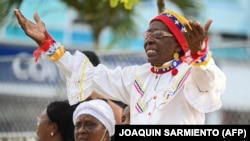In late 2016, the Colombian government ratified a peace agreement that ended a bloody conflict between the government of Colombia and the Revolutionary Armed Forces of Colombia, or FARC. The conflict lasted for over five decades and cost around 260,000 Colombian lives, with another 80,000 people missing.
The United States has a long history of supporting the Peace Accord, and we value its achievements. So it is that we see “four areas of progress” as well as “obstacles to peace that must be addressed with urgency,” said U.S. Ambassador to the United Nations Linda Thomas-Greenfield.
“First, the United States welcomes the Petro Administration’s expressed commitment to fully realize the objectives of the Ethnic Chapter. The Ethnic Chapter sets a vision for an inclusive peace, one that addresses a history of inequity and ensures the rights of Afro-Colombians and Indigenous people going forward. This is a vision that the United States shares and that we’ve long worked to help make a reality.”
“Second, the United States supports rural reform efforts to distribute property to farmers without land,” said Ambassador Thomas-Greenfield. “Third, we continue to support the ongoing transitional justice process. We support this effort and condemn any actions that threaten the peace process. All victims of Colombia’s conflict deserve justice.”
“Fourth, we are encouraged by Colombia’s effort to broaden democratic political participation. We should not lose sight of how significant it is to see former combatants participating in the political process,” she said.
“But while these four developments are cause for optimism, there is still work to be done,” said Ambassador Thomas-Greenfield. “Illicit drug production continues to fuel violence in conflict-affected areas.”
“All acts of violence – whether they are attacks against Colombian security forces, Indigenous and Afro-Colombian communities, former combatants, or human rights and environmental defenders – impede progress,” she said. “And they impede peace. Authorities must act to combat illicit drug production, reduce violence, and ensure illegal armed groups are held accountable.”
The United States is “fully committed to supporting Colombia in this vital work,” said Ambassador Thomas-Greenfield. “We must all continue to stand with Colombia in its efforts to consolidate lasting peace after decades of conflict.”






